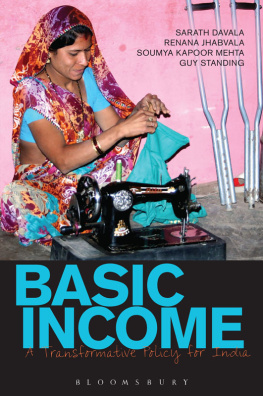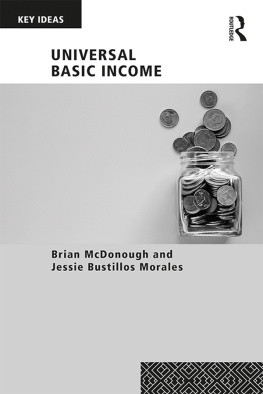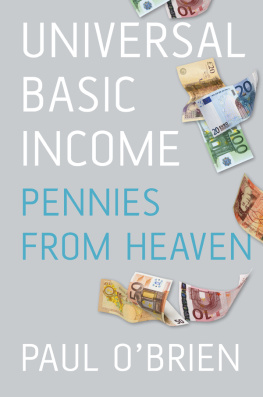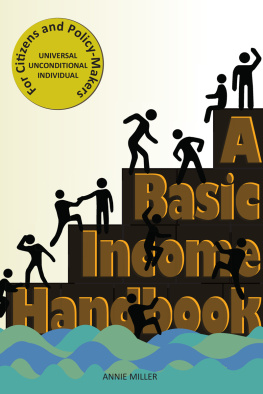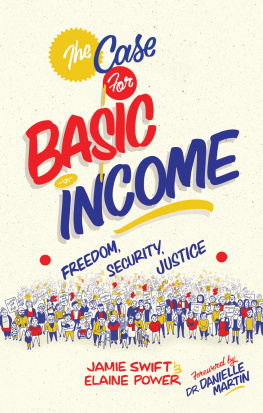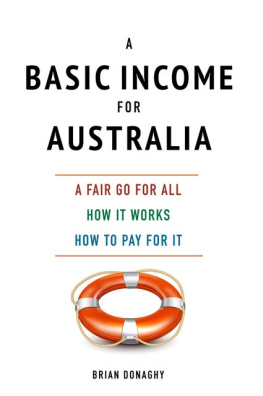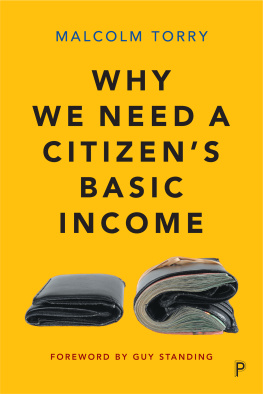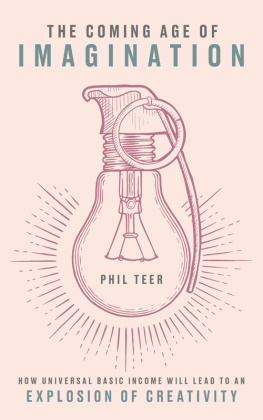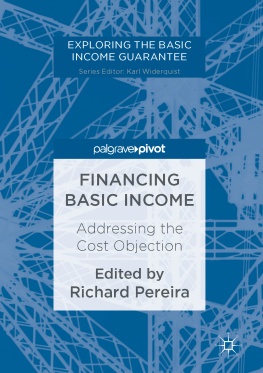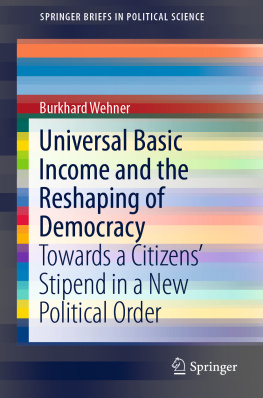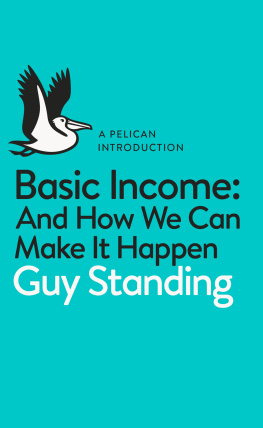Davala - Basic Income
Here you can read online Davala - Basic Income full text of the book (entire story) in english for free. Download pdf and epub, get meaning, cover and reviews about this ebook. year: 2015, publisher: Bloomsbury UK, genre: Politics. Description of the work, (preface) as well as reviews are available. Best literature library LitArk.com created for fans of good reading and offers a wide selection of genres:
Romance novel
Science fiction
Adventure
Detective
Science
History
Home and family
Prose
Art
Politics
Computer
Non-fiction
Religion
Business
Children
Humor
Choose a favorite category and find really read worthwhile books. Enjoy immersion in the world of imagination, feel the emotions of the characters or learn something new for yourself, make an fascinating discovery.
Basic Income: summary, description and annotation
We offer to read an annotation, description, summary or preface (depends on what the author of the book "Basic Income" wrote himself). If you haven't found the necessary information about the book — write in the comments, we will try to find it.
Basic Income — read online for free the complete book (whole text) full work
Below is the text of the book, divided by pages. System saving the place of the last page read, allows you to conveniently read the book "Basic Income" online for free, without having to search again every time where you left off. Put a bookmark, and you can go to the page where you finished reading at any time.
Font size:
Interval:
Bookmark:

Basic Income
Also available from Bloomsbury
The Precariat, Guy Standing
A Precariat Charter, Guy Standing
The Rediscovery of India , Meghnad Desai
Basic Income
A Transformative Policy for India
Sarath Davala, Renana Jhabvala,
Soumya Kapoor Mehta and Guy Standing
Bloomsbury Academic
An imprint of Bloomsbury Publishing Plc

Contents
AAY Antyodaya Anna Yojana
ANM Auxiliary Nurse Midwife
APL Above Poverty Line
ASHA Accredited Social Health Activist
AWW Anganwadi Worker
BPL Below Poverty Line
CCT Conditional Cash Transfer
DBT Direct Benefit Transfer
FES Final Evaluation Survey
HIV/AIDS Human Immunodeficiency Virus/ Acquired Immuno-Deficiency Syndrome
ICDS Integrated Child Development Scheme
ID C ard Identity Card
IES Interim Evaluation Survey
LKG Lower Kindergarten
LMP Local Medical Practitioner
MGNREGS Mahatma Gandhi National Rural Employment Guarantee Scheme
MPUCT Madhya Pradesh Unconditional Cash Transfer Pilot
NBA Nirmal Bharat Abhiyan (Total Sanitation Campaign)
NCAER National Council of Applied Economic Research
NSS National Sample Survey
PDS Public Distribution System
PFES Post-Final Evaluation Survey
PHC Primary Health Centre
PL Poverty Line
RBI Reserve Bank of India
R s . Rupees
SC Scheduled Caste
SEWA Self-Employed Womens Association
ST Scheduled Tribe
TB Tuberculosis
TVCT Tribal Village Cash Transfer Pilot
TV-FES Tribal Village Final Evaluation Survey
TV-IES Tribal Village Interim Evaluation Survey
UKG Upper Kindergarten
UNDP United Nations Development Programme
UNICEF United Nations Childrens Fund
UPA United Progressive Alliance (Congress-led coalition government)
WHO World Health Organization
Note on statistics in text
Most statistics from the evaluation surveys that are cited in the text are rounded to the nearest complete number, with the exception of values that are half (.5), which are rounded to the nearest one decimal point. All statistics are given to one decimal point in the report to UNICEF cited in the text as Jhabvala et al., 2014.
The main proposition underpinning this book is that a modest basic income, paid monthly in cash, individually and without conditions, would be a means of achieving three development objectives that taken together would be transformational .
Although we believe that a basic income along these lines is affordable and technically feasible, we do not go into the arguments in any depth in this book. Resolving those issues is for other occasions, and will depend ultimately on political decisions on priorities. All we set out to do in this book is assess the results of what has been in several respects a unique experiment or set of pilots.
As far as we are aware, there has been no pilot anywhere that has considered the impact of a basic income cash transfer and a collective organization, both separately and in combination. The reasoning behind the decision to design the pilots in this way was that the positive effects of a basic income would be enhanced if a collective body was operational in the community at the same time.
In total, about 6,000 men, women and children in nine villages in Madhya Pradesh received a basic income, most paid every month for about a year and a half. Many opened bank or cooperative accounts for the first time. The exact figures and the methods used are described in the course of the book. The point here is to emphasize the three complementary development objectives.
Any social policy should be assessed by whether or not it contributes to the recipients personal development, that is, their well-being or welfare, by whether or not it contributes to economic growth in a sustainable way, and by whether or not it contributes to emancipation, that is, personal and societal freedom. And in doing so, any social policy should be assessed by ethical principles, which are defined in .
It is our contention, first, that a basic income has the potential to promote a substantial improvement in welfare, and is therefore consistent with the best traditions of Indian policy since 1947, however patchy actual achievements in practice might have been. Improved welfare means improved living standards, in health, access to healthcare, sanitation, schooling, nutrition and so on. And it should mean most improvement for the most disadvantaged and improvement for communities as well as for individuals.
However, a policy of this kind should not be judged or assessed solely or even predominantly in terms of welfare. It is the underlying hypothesis that a basic income could also contribute powerfully to growth, by raising productivity, incomes, and work and labour. As such, it would be wrong and unfair to describe it as simply a welfare policy, to be contrasted with alternative uses of spending that might be presented as promoting economic growth. It is a growth-enhancing measure in its own right, and one that would be beneficial for ordinary Indians of all social categories.
The conventional juxtaposition of welfare and growth is too crude, and should be avoided. The contention is that a basic income would be a means of stimulating economic production, raising the quality and quantity of work, and doing so in an inclusive, sustainable and relatively equitable manner.
The third aspect of social policy tends to be overlooked in societies where the privileged are materially and psychologically distant from the disadvantaged. Great inequalities of wealth, income, status and opportunity invariably produce disdain by the privileged for the plight of the disadvantaged and vulnerable. The proposition that unfolds through the following is that a basic income is emancipatory.
It is a means of enhancing and in some cases reclaiming personal freedom, particularly of women and those who normally receive lower priority in social policymaking, including all those with disabilities and the elderly. For some, it is a means of reclaiming a degree of freedom that they had lost years ago. This is the case with the notorious naukar system, the pattern of debt bondage prevalent in Madhya Pradesh.
The several forms of emancipation are diverse, and are both individual and collective in character. Freedom evolves through the actions of structurally free people, so the emancipatory effects comprise a powerful argument for moving in the direction of a basic income, a road to be taken. Another way of looking at it is that any policy that is not emancipatory in some ways should be shunned.
Taken together, policies that promote personal development, growth and emancipation are, potentially at least, transformational. The idea of transformation encompasses a surge of hope, at the level of individual women and men, at the level of families and households, and at wider levels of community.
Transformation means setting a new course with different structures of decision-making and different types of aspirations and expectations. It means altering states of mind as much as material conditions, altering consciousness of what is possible and what is desirable, and defining anew what is normal.
Social policies also operate in several time dimensions. The pilots that are the core of the book were time-bound, for practical reasons. So are all pilots. So it is sensible to be aware of the limitations and the dynamics that such experiments invariably entail. An impact on some spheres of behaviour and some attitudes may be almost immediate. Others take time to unfold. Effects on some attitudes may take quite a long time. In some cases, a short-term effect may wear off. In others, an effect may be shown for a few individuals or families, leading to demonstration effects, whereby others copy or even surpass those early pioneers.
Font size:
Interval:
Bookmark:
Similar books «Basic Income»
Look at similar books to Basic Income. We have selected literature similar in name and meaning in the hope of providing readers with more options to find new, interesting, not yet read works.
Discussion, reviews of the book Basic Income and just readers' own opinions. Leave your comments, write what you think about the work, its meaning or the main characters. Specify what exactly you liked and what you didn't like, and why you think so.

